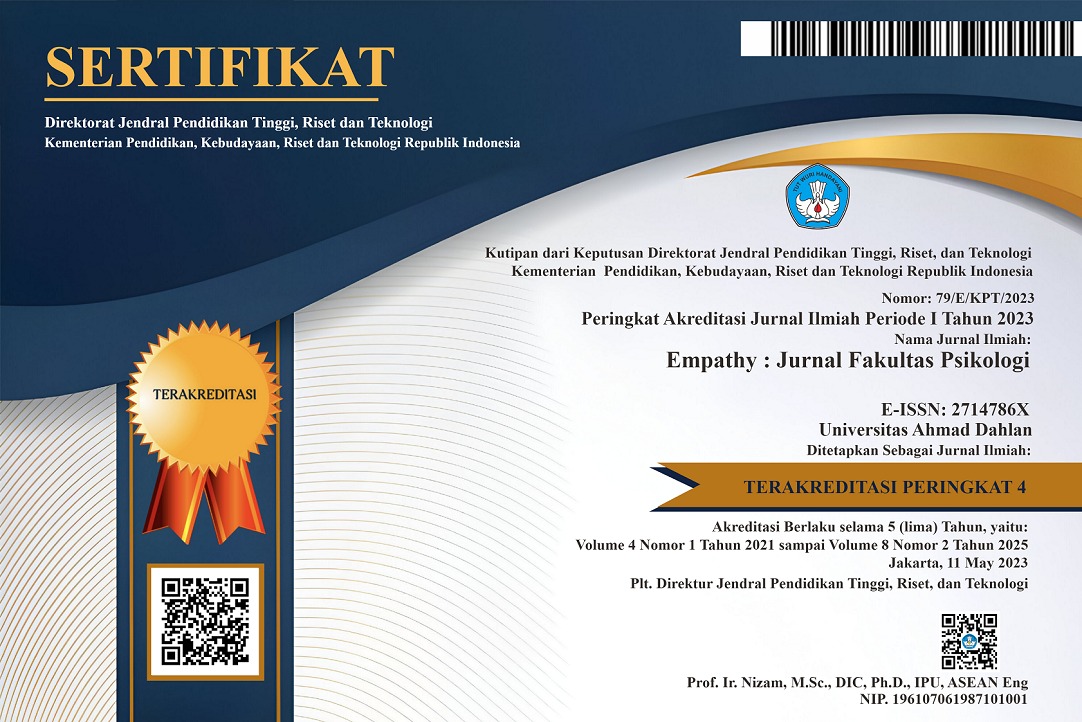The role of reciprocal actions of giving and receiving support on eudaimonic workplace well-being
DOI:
https://doi.org/10.12928/empathy.v6i2.27360Keywords:
Eudaimonic workplace well-being, organization citizenship behavior toward individuals, Perceived co-worker supportAbstract
Employee well-being is gaining increasing attention from various quarters. Studies related to the relationship between reciprocal actions of social support and individual well-being tend to be conducted separately. Additionally, the relationship between receiving support from colleagues and employee well-being also tends to show relatively low to moderate associations. Therefore, this research aims to examine the role of the dynamic reciprocity of social actions in well-being, through an investigation of the mediating role of organization citizenship behavior toward individuals (OCB-I) in the relationship between perceived co-worker support (PCS) and eudaimonic workplace well-being (EWWB). The research participants were active workers who had been working for a minimum of 1 year in their current organization, gathered through convenience sampling techniques. Mediation analysis results indicate that OCB-I significantly mediates the relationship between PCS and EWWB, thus supporting the hypothesis of this research. This study demonstrates the role of social interaction, particularly the dynamics of support among employees, in relation to employee well-being.References
Future Workplace. (2021). Future workplace 2021 HR sentiment survey: Five strategic priorities for the hybrid workplace.
Kropp. B. (2021. April 26). 9 Work trends that HR leaders can’t ignore in 2021. Gartner.
International Labour Organization. (t.t.). Workplace well-being. Diambil 10 November 2021.
Bartels. A. L.. Peterson. S. J.. & Reina. C. S. (2019). Understanding well-being at work: Development and validation of the eudaimonic workplace well-being scale. PLOS ONE. 14(4). e0215957.
Turban. D. B.. & Yan. W. (2016). Relationship of eudaimonia and hedonia with work outcomes. Journal of Managerial Psychology. 31(6). 1006–1020.
Wang. X.. Li. A.. Liu. P.. & Rao. M. (2018). The relationship between psychological detachment and employee well-being: The mediating effect of self-discrepant time allocation at work. Frontiers in Psychology. 9.
Zhang. X.. Lin. Z.. Liu. Y.. Chen. X.. & Liu. D. M. (2020). How do human resource management practices affect employee well-being. A mediated moderation model. Employee Relations: The International Journal. 42(4). 903–919.
Arnold. J.. Randall. R.. Patterson. F.. Silvester. J.. Robertson. I.. Cooper. C.. Burnes. B.. Harris. D.. & Axtell. C. (2016). Work psychology: Understanding human behaviour in the workplace (6 ed.). Pearson Education.
Biggio. G.. & Cortese. ClaudioG. (2013). Well-being in the workplace through interaction between individual characteristics and organizational context. International Journal of Qualitative Studies on Health and Well-being. 8(1). 19823.
Sutton. A. (2021). Work psychology in action (2 ed.). Macmillan Education.
Mensah. A. (2021). Job stress and mental well-being among working men and women in Europe: The mediating role of social support. International Journal of Environmental Research and Public Health. 18(5). 2494.
Wepfer. A. G.. Allen. T. D.. Brauchli. R.. Jenny. G. J.. & Bauer. G. F. (2018). Work-life boundaries and well-being: Does work-to-life integration impair well-being through lack of recovery. Journal of Business and Psychology. 33(6). 727–740.
Taris. T. W.. & Schaufeli. W. B. (2014). Individual well-being and performance at work: A conceptual and theoretical overview. Dalam M. van Veldhoven & R. Peccei (Ed.). Well-being and Performance at Work (hlm. 15–34). Psychology Press.
Biswas. T.. Mäkelä. L.. & Andresen. M. (2022). Work and non-work-related antecedents of expatriates’ well-being: A meta-analysis. Human Resource Management Review. 32(3). 100889.
Curry. O. S.. Rowland. L. A.. Van Lissa. C. J.. Zlotowitz. S.. McAlaney. J.. & Whitehouse. H. (2018). Happy to help. A systematic review and meta-analysis of the effects of performing acts of kindness on the well-being of the actor. Journal of Experimental Social Psychology. 76. 320–329.
Titova. L.. & Sheldon. K. M. (2021). Happiness comes from trying to make others feel good. rather than oneself. The Journal of Positive Psychology. 17(1). 1–15.
Fisher. C. D. (2014). Conceptualizing and measuring wellbeing at work. Dalam P. Y. Chen & C. L. Cooper (Ed.). Work and wellbeing: Vol. III (hlm. 9–33). Wiley.
Downloads
Published
Issue
Section
License
Authors who publish with Empathy: Jurnal Fakultas Psikologi agree to the following terms:
- Authors retain copyright and grant the journal right of first publication with the work simultaneously licensed under a Creative Commons Attribution License (CC BY-SA 4.0) that allows others to share the work with an acknowledgment of the work's authorship and initial publication in this journal.
- Authors are able to enter into separate, additional contractual arrangements for the non-exclusive distribution of the journal's published version of the work (e.g., post it to an institutional repository or publish it in a book), with an acknowledgment of its initial publication in this journal.
- Authors are permitted and encouraged to post their work online (e.g., in institutional repositories or on their website) prior to and during the submission process, as it can lead to productive exchanges, as well as earlier and greater citation of published work.

This work is licensed under a Creative Commons Attribution-ShareAlike 4.0 International License.



